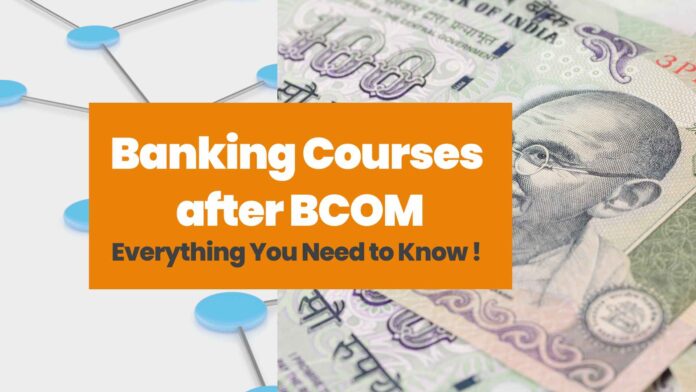Introduction
Are you a BCom graduate looking for ways to advance your career in the banking sector? Banking courses after BCom are an excellent way to not only increase your skill set but also open your career to numerous new job possibilities. By taking part in banking courses after bcom you can gain a professional certification that sets you apart from other candidates or even propel yourself into a higher-level managerial role.
Professional Certifications: After completing one of these banking courses after bcom, you will receive an official certification that is widely recognised in the banking industry. This certificate is proof of your commitment to learning and will help you stand out from other applicants when applying for roles within the sector. It is also beneficial if you’re looking to switch specializations within the banking field.
Curriculum Details: These banking courses after bcom typically cover topics such as financial markets, international banking, accounting principles, investment knowledge and portfolio management, risk management, and business strategy. Depending on which institute you choose, some may also offer additional modules such as credit analysis and corporate finance.
Job Opportunities after Completion: Once you’ve completed banking courses after bcom, there are plenty of job opportunities available to pursue. Some common roles are financial advisors, portfolio managers, investment bankers or analyst positions within banks or large corporate companies. You could also look into starting up a consultancy firm giving clients advice on investment strategies or transitioning into teaching finance at a university level.
Benefits of Taking banking courses after bcom

Taking banking courses after bcom can be an important step in advancing your career. Having the increased skill set and improved career prospects that come with additional education can be a great benefit to you. Specialization in banking can give you a competitive edge and make you stand out from the rest.
Not only will taking banking courses after bcom give you the knowledge you need to understand financial systems, but it will also help strengthen your presence in the job market. You’ll learn about regulations and laws related to banks and other financial institutions, as well as develop new insights into banking operations. You’ll be equipped with the skills needed to ensure compliance and stay ahead of industry trends.
Having certification or additional education in banking could also open up more economic opportunities for employability. Potential employers may view someone with a degree or special training in banking more favourably compared to those without such qualifications. This could put you at an advantage when it comes to pursuing a career in banking or related industries.
Overall, taking banking courses after bcom is an excellent way for those interested in making a career out of this field to hone their knowledge, expand their skill set and increase their chances of success in the job market. With better understanding comes higher value, which might just make all the difference once it comes time to find employment! Following are the Top 8 banking courses after bcom.
Have a look at the best PG Program In Investment Banking
M.Com in Banking and Finance
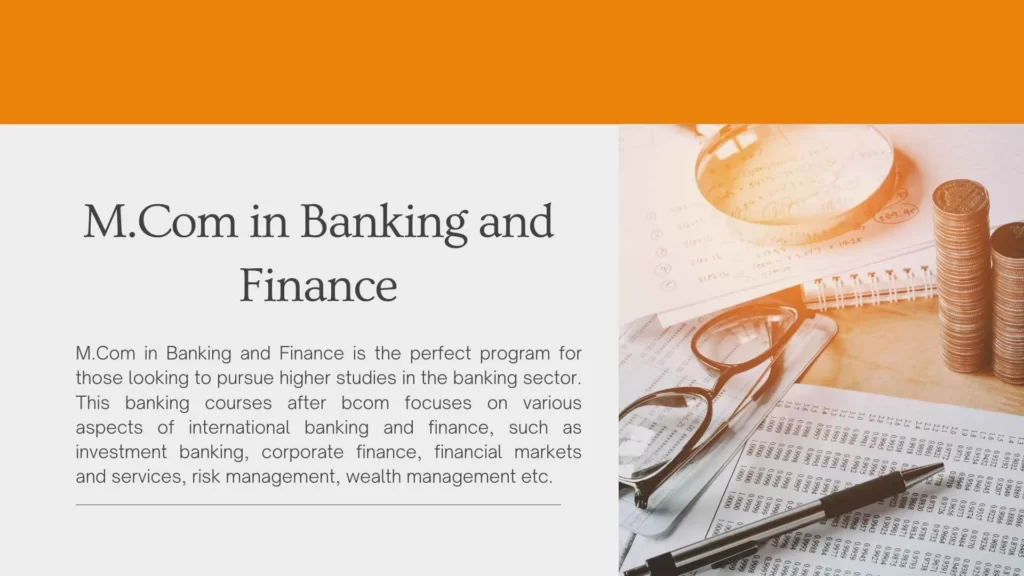
In this section, we are discussing everything there is to know about M.Com in Banking and Finance, including course fees, the best institutes in India, and banking courses after BCom.
M.Com in Banking and Finance is the perfect program for those looking to pursue higher studies in the banking sector. This banking courses after bcom focuses on various aspects of international banking and finance, such as investment banking, corporate finance, financial markets and services, risk management, wealth management etc.
Additionally, it also covers various topics from commerce such as accounting & audit practice and theory of business organization. After completing an M.Com degree programme in Banking & Finance, you will be able to get into roles such as financial analyst or business advisor at banks or other financial institutions.
When it comes to course fees for M.Com in Banking and Finance, they vary depending on the institutes offering them. However, most institutes will charge between 1-2 lakhs per semester depending on the institute’s infrastructure and faculty strength etc., making it an affordable option for those looking to pursue higher studies in banking & finance after BCom.
In terms of the best institute offering M.Com in Banking & Finance programs in India, there are many options available. Some of the top-notch institutes that offer this program include Christ University (Bangalore), Indian Institute of Management (IIM Calcutta), SRM University (Chennai) etc., among others. This course seems a great option for one who considers banking courses after bcom.
Post Graduate Certificate in Investment Banking
If you are a recent BCom graduate looking to get into investment banking, a postgraduate certificate in investment banking could be the perfect banking courses after bcom to kickstart your career. This program provides an introduction to the world of investing and banking, giving you the skills and knowledge needed to pursue a professional career.
Investment banks are responsible for helping companies and organizations access capital by selling securities on their behalf. They also help investors make decisions about how to manage their money and investments. As such, having a background in this field is one of the best ways to prepare yourself for a successful career.
When it comes to finding the right banking courses after bcom, there are many factors that need to be taken into consideration. The course fee should reflect the quality of instruction as well as any additional materials or services provided. The best institute in India for postgraduate certificates in investment banking is IIM Kashipur, which has been offering banking courses since 2014. Along with its comprehensive curriculum, IIM Kashipur also has a team of experienced faculty members who have years of experience working in the finance industry.
In addition one of the banking courses after bcom, IIM Kashipur offers various internships and placements through its connections with leading banks like ICICI Bank and HDFC Bank. This can give students invaluable insight into how these banking operations work firsthand–providing them with an edge when competing for job roles in this lucrative field.
Overall, if you’re interested in pursuing banking courses after bcom in investment banking, there’s no better option than IIM Kashipur. With its comprehensive courses and strong industry connections, this institute provides an excellent foundation for building a successful career as an investment banker or financial analyst.
Look at the top Financial Modelling courses
PGDM in Banking Financial Services
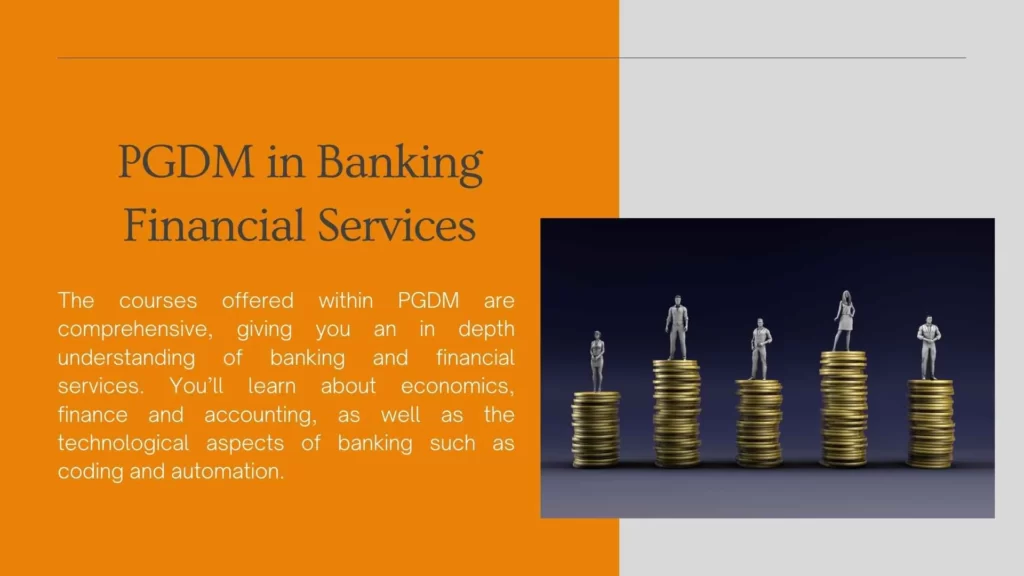
If you’re looking for banking courses after bcom, then a Post Graduate Diploma in Management (PGDM) with a focus on Banking & Financial Services might be the right choice for you. Such, banking courses after bcom can help you build up knowledge and skills in this industry and make you a more competitive candidate in the job market.
The banking courses after bcom offered within PGDM are comprehensive, giving you an in-depth understanding of banking and financial services. You’ll learn about economics, finance and accounting, as well as the technological aspects of banking such as coding and automation. You will also gain practical skills through case studies and projects that are often required to complete the courses.
The fees for these courses may vary from institute to institute; however, it is often worth the cost due to the increase in your career prospects once you have completed your diploma. There are numerous institutes offering this course, both domestically and globally. If you are looking for some of the best banking courses after bcom, PGDM institutions in India, then the Indian Institute of Management Ahmedabad (IIMA), SPJain Institute of Management Research (SPJIMR) Mumbai and XLRI Jamshedpur are some premier options that offer excellent courses with specializations in banking & financial services.
Overall, PGDM is the ideal banking courses after bcom if you want to start off or switch to a career in banking & finance services after completing your BCom degree program. It provides valuable information about this field which can be beneficial when pursuing roles such as a private banker or financial analyst. Furthermore, it will give you an edge over other applicants when searching for job opportunities due to its specialization aspect.
Advanced Certificate in Banking Laws and Loan Management
With such banking courses after bcom, you’ll gain the knowledge and skills to understand banking fundamentals and advance your career.
Let’s take a look at what this course will cover: the most important aspects of banking law and loan management. You’ll learn about risk assessment, financial regulation, credit analysis, security law, mortgage-backed securities, structured finance products, syndicated loans and more. After completing this course, you’ll be well-versed in all aspects of banking laws and loan management.
Don’t worry about the cost of taking this course it is surprisingly affordable. Fees vary depending on which institute you choose to study with but are usually kept quite low. Many institutes provide payment plans or even scholarships that can help make the fees more manageable.
But where should you go? There are so many educational institutes offering these banking courses after bcom in India that it can be tough to decide which one is right for you. Luckily for you, there is an easy answer Global Skill Development Corporation (GSDC) is one of the best institutes available in India today when it comes to banking courses after bcom.
They offer top-notch education partners with leading bankers and subject experts from around the world, who create specialized modules to give their students the best opportunities for success in their educational endeavours. Plus they offer an unbeatable fee structure!
Visit the best nse investment banking course
Professional Programme for Commercial Banking (PPCB)
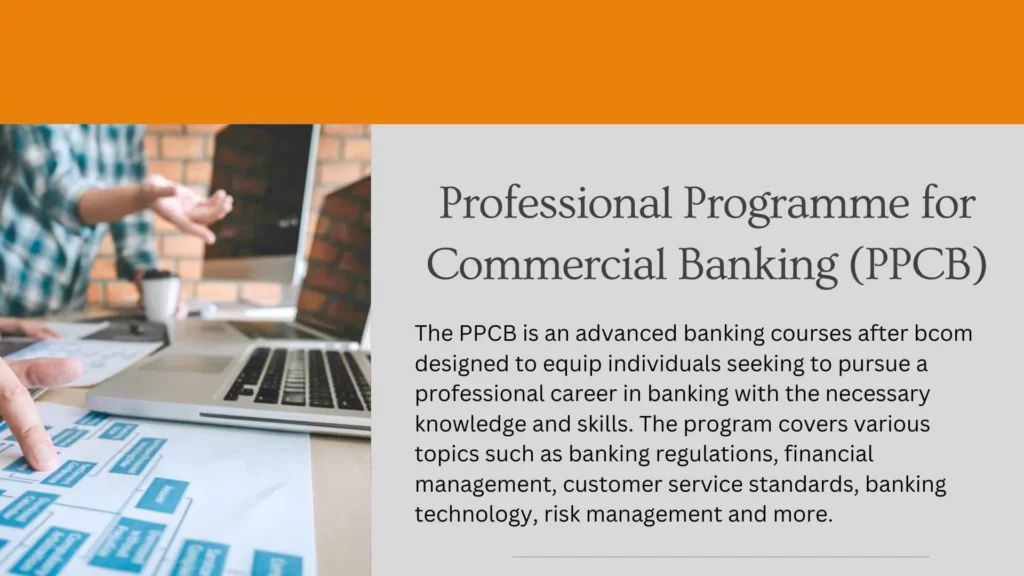
The PPCB is an advanced banking courses after bcom designed to equip individuals seeking to pursue a professional career in banking with the necessary knowledge and skills. The program covers various topics such as banking regulations, financial management, customer service standards, banking technology, risk management and more.
The PPCB program fee varies depending on the Institute. But generally speaking, most Institutes can offer a competitive fee structure. If cost is a concern for you, there are several scholarship options available as well.
When it comes to finding the best institute for pursuing banking courses after bcom, it’s important to research your options thoroughly. Look for Institutes that offer comprehensive courses with experienced faculty and up-to-date resources; one such institute is the Indian Institute of Banking & Finance (IIBF). IIBF offers several diplomas such as Certified Treasury Manager (CTM) and International Trade Finance Professional (ITFP) that are specifically tailored towards financing professionals.
Apart from the PPCB course, there are many other banking courses after BCom that individuals can pursue either through their college or through private institutes. Some of these include Certificate in Banking Technology & Operations (CBTO), Advanced Diploma in Bank Management (ADBM), and Certificate Course in Retail Bank Management (CCRBM). All these courses help individuals gain valuable knowledge and teach them important concepts related to banking services.
MBA in Banking and Finance
Getting an MBA in Banking and Finance can open up a world of possibilities for you. It is a course that provides knowledge and skills related to the banking sector and also helps you understand the principles of accounting and finance.
MBA courses in Banking and Finance focus on teaching students how to manage financial investments, analyze market trends, develop effective strategies, and understand banking regulations. The program also covers topics such as project management, risk assessment, corporate finance, taxes and global trade. Fees for these courses vary depending on the institute you choose to study in.
Finding the best institute for an MBA in Banking and Finance can be a difficult task as there are many options available in India. However, some notable institutes that offer excellent education include IIMs (Indian Institute of Management), XLRI Jamshedpur (Xavier Labour Relations Institute), FMS Delhi (Faculty of Management Studies), SPJIMR Mumbai (Shailesh J Mehta School of Management), etc.
If you already have a degree in BCOM (Bachelor in Commerce), then you can consider taking up banking courses after bcom to enhance your career prospects in banking and finance domains like Certified Financial Planner (CFP), Chartered Financial Analyst(CFA), National Stock Exchange Certification on Derivatives Markets(NSECDM), and Chartered Accountants Course(CA). These banking courses after bcom equip you with the necessary financial analysis skills across industries that increase your job prospects manyfold. Additionally, most of these certification programs require lesser time duration than MBAs which means you can quickly start working after completing them.
Short-term Post Graduate Diploma in Banking Operations
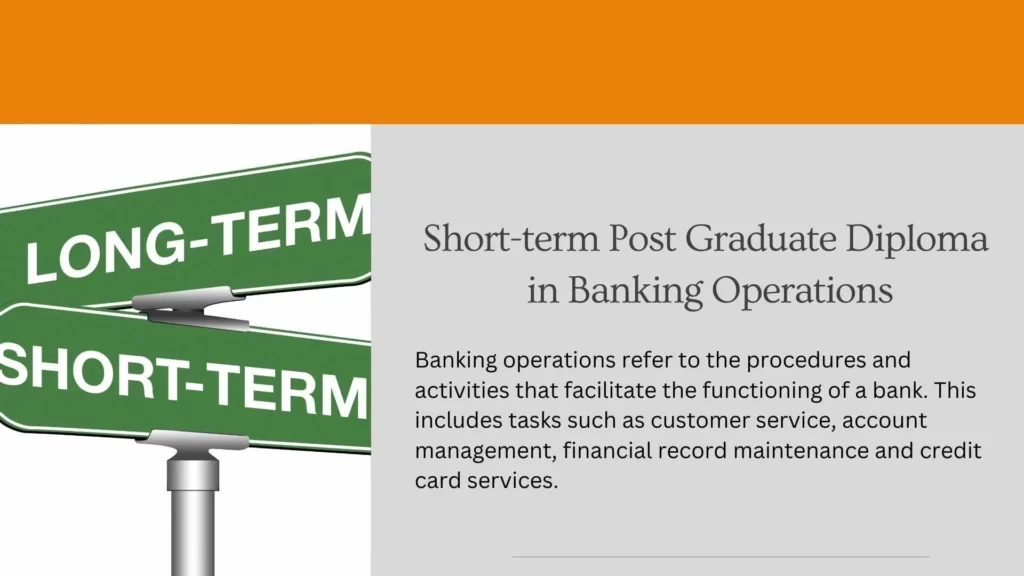
Banking operations refer to the procedures and activities that facilitate the functioning of a bank. This includes tasks such as customer service, account management, financial record maintenance and credit card services. A short-term postgraduate diploma in Banking Operations equips students with the knowledge and skills required to manage all these banking functions efficiently and effectively.
The course fees for a short-term postgraduate diploma in Banking Operations vary depending on the institute you choose. However, it’s important to note that this program is highly affordable compared to other postgraduate programs. Additionally, it can easily be completed within 6–9 months, making it ideal for earning a professional qualification without having to invest too much time or money.
When deciding which institute you want to pursue your short-term postgraduate diploma from, there are various factors you need to consider: their reputation, the qualification of teachers and how up-to-date their syllabus is with current banking operations practices. India has some of the best institutes when it comes to providing quality education in banking operations, including The Indian Institute of Banking & Finance (IIBF) and The Institute of Chartered Accountants of India (ICAI). Both these institutes offer world-class courses in banking operations that will help you build a successful career in this field.
If you’re serious about furthering your career as a banker or taking up banking courses after bcom, banking management roles then enrolling in a short-term postgraduate diploma programme is an excellent way to quickly gain qualifications.
Certificate Program in General Insurance (CPGI)
Are you looking for banking courses after bcom? If so, then the Certificate Program in General Insurance (CPGI) should be on your radar. This certification is designed to provide you with the knowledge and skills necessary to become a professional in general insurance.
The CPGI program covers various topics related to the insurance industry, such as the principles of insurance, risk management, claims processing, legal aspects, and regulatory framework. It also equips you with skills that can help you manage customer relationships effectively and sell products more successfully.
The course fees for CPGI are very affordable and it is offered by some of the best institutes in India. Depending on the institute you choose, there may be full-time or part-time options available as well. Full-Time students typically complete their program within 8 to 12 months while part-time students take up to two years.
Once you have completed the CPGI certification, you will be able to apply for various job opportunities in general insurance companies across India. You will also gain access to some of the most prominent professional networks in insurance and finance that can open many doors for your career growth.
So if you’re a BCom graduate looking for banking courses after graduation then look no further than CPGI! It is an excellent way to boost your resume and open up many opportunities for you in the future!
Demand for Banking Courses after Bcom in future
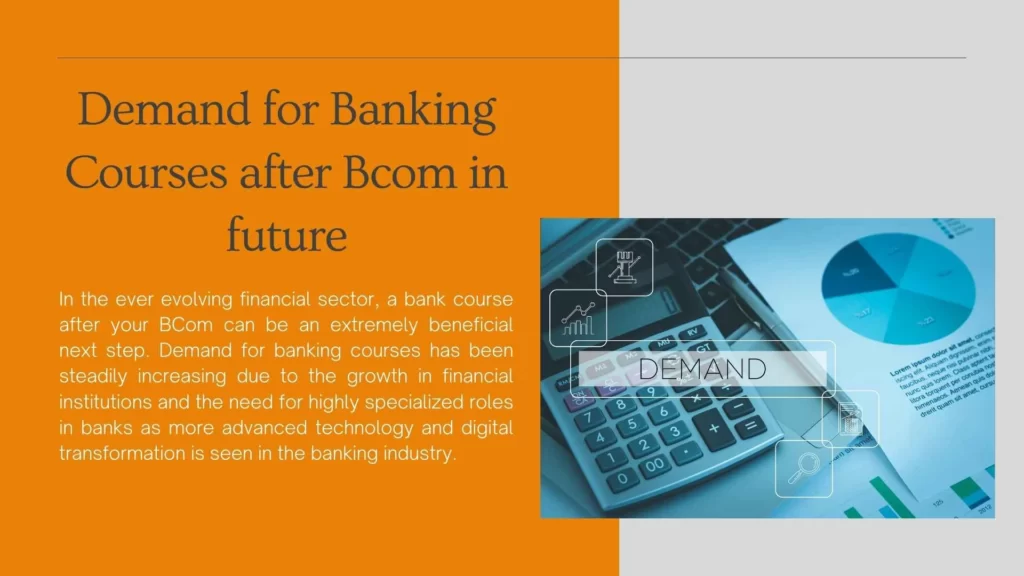
In the ever-evolving financial sector, a bank course after your BCom can be an extremely beneficial next step. Demand for banking courses has been steadily increasing due to the growth in financial institutions and the need for highly specialized roles in banks as more advanced technology and digital transformation are seen in the banking industry.
The current global economic landscape adds to this increased demand for banking courses. With bank consolidation and regulation, along with the emergence of new financial technologies, there has never been a better time to pursue a bank course after your BCom. The changing consumer behaviour is resulting in more customer-focused offerings and services, giving rise to new paradigms that require new skill sets.
If you are looking to pursue a career in the banking sector or gain an edge over your peers, then taking up a bank course after your BCom can help you gain an edge over the competition by offering specialized skills related to digital transformation and financial technology innovations. This will give you an advantage when applying for jobs in modern banks as you will possess knowledge that is vital in today’s rapidly changing landscape.
By taking up a bank course after your BCom, you will have access to various topics such as investment banking, risk management, international finance and mergers & acquisitions which are essential skills needed by contemporary banks and financial institutions. Additionally, it will also offer valuable insights into regulatory compliance matters that may arise during the everyday operations of banks across different countries or jurisdictions.
For those of you who are looking to get ahead of the curve in terms of financial market knowledge and practices, then considering a bank course after your BCom could provide you with invaluable experience on what it takes to succeed professionally within the banking industry today.
Conclusion
Once you have completed your BCom degree, there are a plethora of banking courses after bcom available to further shape your skillset and gain a better understanding of various aspects of banking. You could opt for a postgraduate diploma in International Banking or Business Finance and Banking which can give valuable insight into how business finances are managed by banks across the world.
Alternatively, if you want a more practical component to banking, consider pursuing a PG diploma in Financial Services Management to get hands-on experience with real-world scenarios.
Alternatively, if you would like to focus on one area of banking, there are also some specialized courses offered after your BCom degrees such as an MBA in Financial Risk Management or another Masters’s program such as an MSc in Quantitative Finance with an emphasis on risk analysis and modelling.
These banking courses after bcom equip students with skills that can come extremely useful when it comes time to make decisions regarding investments or hedge funds within large organizations.
When considering any course, it is always important to know what advantages come along with taking the course itself. The major advantage of taking any banking courses after bcom is the number of doors that open up from having this specialized knowledge.
Frequently Asked Questions
To become an Investment Banker, you need to have a 3 or 4-year bachelor’s degree. Examples of suitable degrees include Bachelor of Commerce (B.Com), Bachelor of Arts (B.A.) in finance, B.A. in Economics and Bachelor of Business Administration in Finance.
If you don’t like the work involved in this program, it will be difficult for you.
The Certified Management Accountant (CMA) program is the best way to prepare for a career in banking. Banks often hire CMA’s for auditing and accounting roles.
Your job options as a newcomer to the workforce depend on your educational level. It’s not necessary to have a BCom degree to find work in banking; other qualifications are also accepted.
An MBA in banking gives you valuable knowledge and can help you progress in your career. It will give you an understanding of how the banking sector works, which can be useful if you are looking for a job in a bank after getting your MBA.
To be eligible for the PO post, candidates must be between 20 and 30 years old. The age limit for a bank clerk post is 20 to 28 years. Candidates must also have a graduation degree from a university recognized by the central government of India.
IBPS is a government organization that administers tests to hire clerks for public banks. These exams at the clerical level are straightforward and easy to pass. IBPS is known for its openness and speediness in conducting the exams and releasing the results.
The State Bank of India (SBI) and the Institute of Banking Personnel Selection (IBPS) both offer clerical exams. A few years ago, applicants had to attend an interview stage for bank clerks, but this is no longer required. You can take either the IBPS or SBI clerk exams, or any other similar exam for a clerk position in a central government bank (Public Sector Bank).
If you put in enough effort, a year is plenty of time to prepare for a bank PO.
Yes! You can build a career in many different fields, such as management, law, hospitality, travel and tourism, general commerce, banking, insurance, foreign trade, journalism, accounting, animation, and economics.




